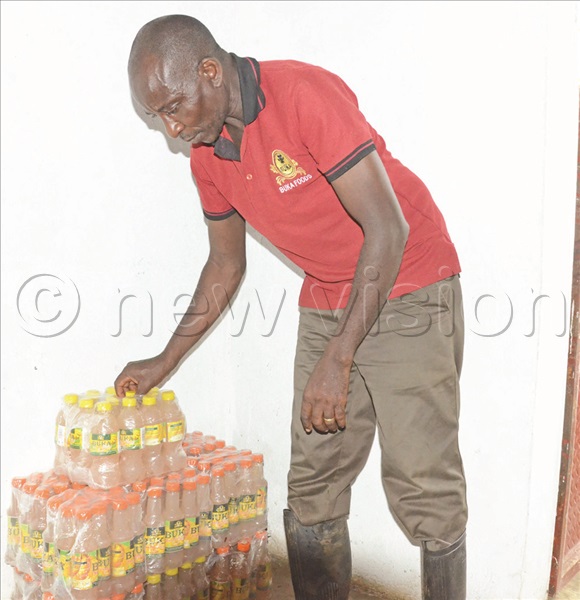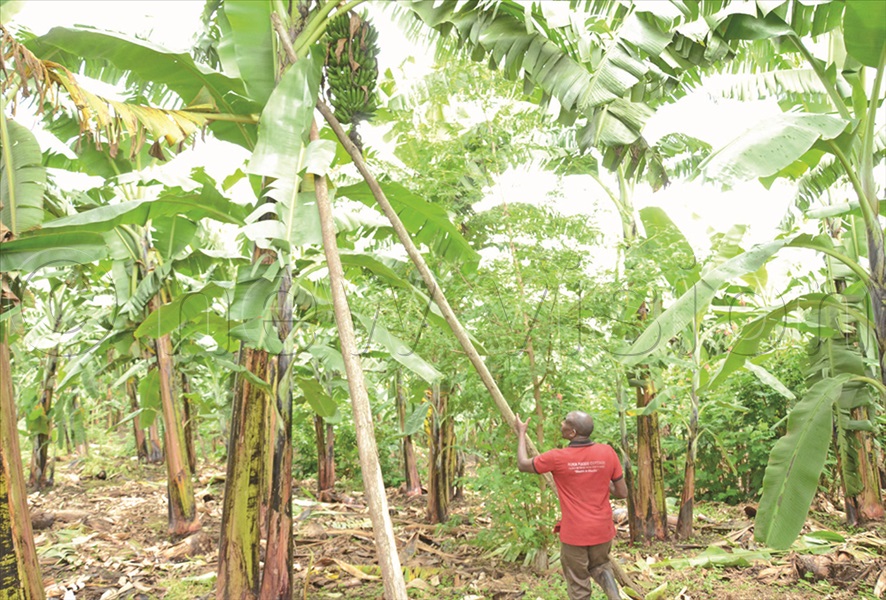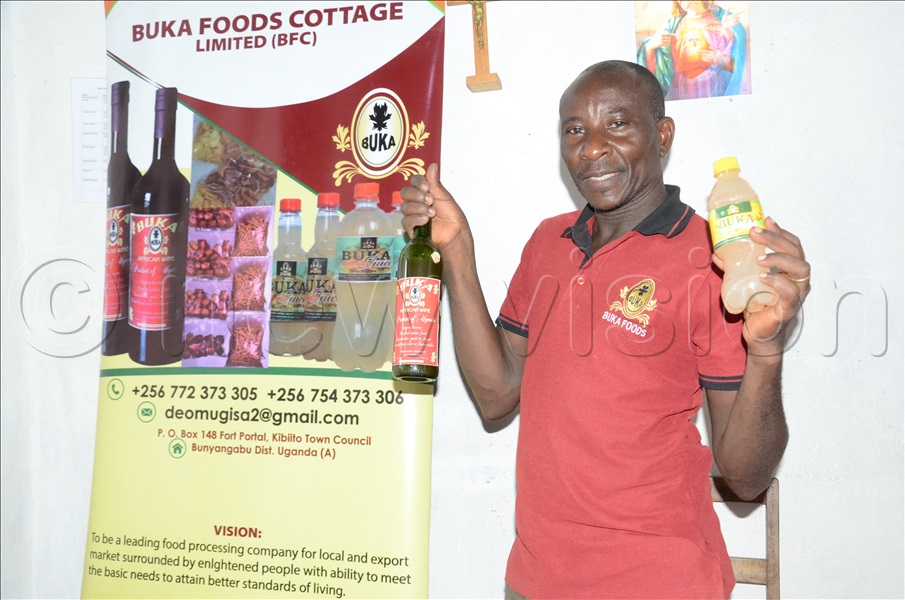“I am going to Buka Foods,” I tell a bodaboda rider along the Fort Portal-Kasese road.
Although I am 20km from Buka Foods, the farm products and the owner are well-known in the area.
The firm belongs to Deo Mugisa, who, some years ago, visited Europe as one of the winners of the Best Farmers competition, organised by Vision Group with support from the Embassy of the Netherlands, dfcu Bank, KLM Airlines and Koudjis Nutrition BV.

Mugisa, 52, is a resident of Bubwika in Kibiito Town Council, Bunyangabu district. He deals in banana juice processing.
“Winning the Best Farmers competition made me popular here. When I travelled to the Netherlands, a number of people got to know me,” he says.
It is clear that several changes have taken place ever since he won. Mugisa’s banana juice is now sold as far as Fort Portal, Kasese and Bundibugyo. The juice processing unit has become larger and better equipped.
“Before, I used to pasteurise five 20-litre jerrycans (100 litres) of juice per day. I have now increased the capacity to 400 litres per day,” he says.
Mugisa won sh7m as part of his prize in 2018. He used part of the money to acquire a larger pasteuriser with the capacity to boil 500 litres, thus improving his service.

This is not the only visible change at Buka Foods.
Mugisa also acquired a delivery vehicle, which he says has eased movement of his produce to farther areas, including Bundibugyo.
He says: “Before I won, I was using bikes and taxis to deliver my products.”
When he won, he had over seven enterprises including bananas, rabbits, chicken, passion fruits, value addition on bananas, maize and beans.
Today, he has specialised in bananas and juice processing.

“During training before going to the Netherlands, we were urged to specialise in a few enterprises for easy management,” he says.
Going into value addition
At the turn of the year 2000, Mugisa grew bananas on two acres.
“That was my main activity, but the earnings were low. In 2005, I trained in commercial sustainable agriculture at Kabarole Resource Centre. It is then that I decided to start adding value to my bananas,” he says.
Previously, Mugisa sold his bananas to traders from Kampala and around Kabarole, for between sh7,000 and sh10,000 per bunch.
However, he believed that it was possible to earn more from the enterprise through value addition.
In 2005, through the National Agricultural Advisory Services (NAADS) programme, he visited farmers in Kabarole district who were involved in wine and juice processing.
To start the project, Mugisa used sh500,000 of his savings from the plantation to buy jerrycans, bottles and labels from Kampala.
He then harvested 20 mature bunches of matooke which he kept in a dry and clean store to ripen. After five days, the matooke was ready for processing.
Gradually, Mugisa perfected the trade.
“I marketed the juice to those who were near me, then went to Fort Portal, Kasese and Bundibugyo. The market quickly grew because my service leaned on quality,” he says.
In the last four years since Mugisa won, he has increased production to 2,000 cartons from 100 cartons of 12 bottles each.
“It is now quite a large cottage enterprise, thanks partly to the lessons from the Netherlands,” he says.
“The process of making good wine takes 12 months. So, to stay on the market, I have to ensure that I have bananas at home.
Mugisa sells a bottle of wine at sh15,000 and a small one of juice at sh1,500.
From a 20-litre jerrycan, Mugisa gets sh300,000, and after deduction of costs, his profit is about sh200,000.
COVID-19 impact
Mugisa’s business was affected during the COVID-19- induced lockdown.
“My workers could not move due to the restrictions then. Many bananas were rotting in the farm,” he says.
Mugisa also had to reduce the number of workers at the farm to save on expenses. He now employs workers on contractual basis.
“Previously, I employed six permanent workers, but when COVID-19 struck, they became redundant because we had few customers. I then started employing depending on the work available,” he says.
Among other activities, the hired workers harvest and weed the shamba.
“I pay each worker sh200,000 to sh250,000 depending on the monthly tasks achieved,” he says.
Community impact
“I have supported other banana farmers by assuring them of a market for their produce,” he says.
Mugisa also trains other farmers, especially in value addition and matooke shamba management.
Family involvement
Mugisa says he works on the banana plantation with his wife Margaret Asiimwe since all his children are in school.
“Working together saves us costs on external labour,” he says.
Asiimwe says working with her husband has helped to sustain the family business.
“We get our bread from this business. The only way to sustain it is to work together to keep it running,” she says.
Achievements
Mugisa has bought more land using proceeds from the venture. He has expanded his banana plantation and grown other crops.
From the business, Mugisa has managed to pay school fees for his children and also constructed a family home.
Considering all the milestones that Mugisa has hit he says: “My biggest achievement was visiting Europe without paying a single coin. I have heard about hundreds of people who have failed to go to Europe even when they had the money,” he says.
Plans
Mugisa says two years ago, he successfully certified his wine and juice with the Uganda National Bureau of Standards and plans to start exporting his produce across East Africa.
However, he says this requires him to invest more into the project to increase its quality.
He also wants to construct big cages for his rabbits and tap into the bigger market.
How to manage a banana plantation
To suit harvesting frequency, Mugisa says a banana plantation needs a continuous process of uprooting excess suckers from the plant.
“Removing of the side shoot is done until the emergence of flowers; one to three stems, at most per clump (the bearing one, the follower and the sucker),” he says.
Sucker management is important to avoid high mats and to maintain proper spacing. High or many suckers per mat could easily fall.
Mulching
This is used to conserve moisture in the soils, and to reduce rainfall runoff to avoid erosion. Mulch also improves the soil as it rots. However, mulch is known to serve as a breeding place for banana weevils and other placed your mulch too close to the mother plant, it will affect the growth of the young suckers.
This means you need to work out a balanced approach to mulching your banana plantation.
Staking
Bananas are susceptible to wind and should be staked to provide extra support to the stems. Normally, forked poles are used for banana staking.
Fertiliser requirements
Bananas absorb a lot of nutrients from the soil. Therefore, there is a need for one to replenish the soil using external sources such as the farm yard manure, crop residues, homestead and kitchen refuse.
You should, however, avoid applying metals or polythene on banana plants. Manure should also not be applied too close to the banana plant as this can encourage weevils to breed and cause a high mat condition.
For fertilisers, Mugisa says he does not incur any cost because he uses the droppings from the rabbits.
Soil management
Mugisa says he has dug trenches around the bananaplantation to harvest water and also prevent soil erosion.
“I use appropriate recommended agronomy practices to conserve soil and I have also planted nitrogen-fixing plants in the banana plantation,” he says.
Mugisa explains that is it good to harvest mature bananas instead of the ripe ones because if they all ripen at the same time, he cannot, squeeze all of them at once.
In addition to all this, Mugisa says one shouLd observe high levels of sanitation and hygiene for high-quality products.
Expanding banana shamba
“On return from the Netherlands, I decided to stop some of the enterprises I had on the farm to create more space for bananas,” he says.
Subsequently, he planted a new 3-acre banana shamba, specifically the kisubi variety, which is used for making juice.
“I now have this banana shamba as one block. Previously, I had scattered the bananas among other crops. This makes my farm more organised than before,” he says.
His shamba produces about 100 bunches a month. However, with the increased production of juice, his farm is not able to supply everything that he needs.
“I have encouraged fellow farmers to grow this banana type so that I can buy from them,” he says.
He says he buys about 100 bunches monthly at between sh10,000 and sh15,000.
Challenges
The biggest challenge Mugisa faces is the limited supply of bananas on the market. This, he attributes to the banana wilt disease, which has wiped out most of the sweet banana plants in the area.
“Since the process of making wine takes over 12 months, I need to have bananas every day because the demand for wine is high,” Mugisa notes.
Mugisa says he struggles with price fluctuations because of traders who take the bananas to South Sudan.
What others say
Amooti Joan Nyakato, Fort Portal
Mugisa helped me to start commercial banana farming when I visited him in 2019. I have two acres that I manage. I am now able to earn a living from the plantation.
Julius Masereka, farmer Kasese
I have started processing juice under Mase Juices. This was after I saw what Mugisa was doing. His processing is based at home, but the quality of the product is good. Value addition to bananas improves earnings per bunch by over 200%.





